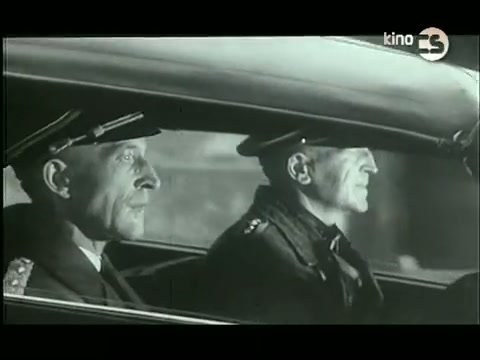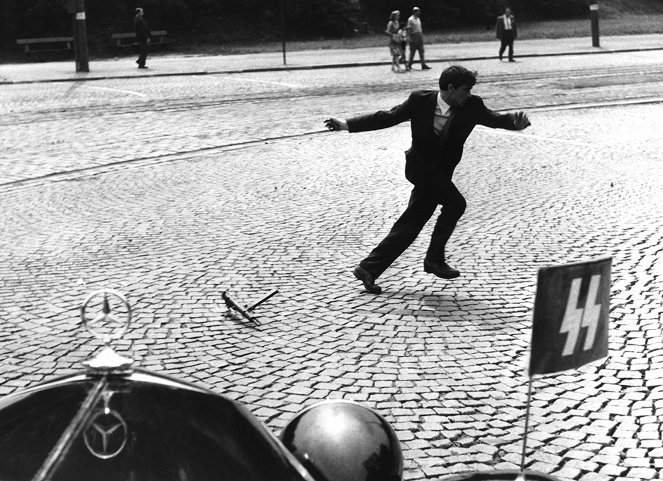Realização:
Jiří Sequens st.Câmara:
Rudolf MiličElenco:
Radoslav Brzobohatý, Rudolf Jelínek, Ladislav Mrkvička, Luděk Munzar, Jiří Kodet, Josef Vinklář, Siegfried Loyda, Harry Studt, Wolf Goette, Gerhard Rachold (mais)Sinopses(1)
It is autumn 1941. Acting Reichsprotector Reinhard Heydrich has taken up his position in the occupied Czech lands and Moravia. His old rival from the Nazi supremoes, Admiral Canaris, objects to Heydrich's cruelty, which raises great hatred everywhere he goes. Meanwhile, selected Czechoslovak soldiers undergo paratrooper training in Great Britain; the soldiers are then to be dropped into Czech territory to support the local resistance. Several groups of well-trained men will soon see their homeland. They succeed in contacting members of the resistance and find a hiding place in Prague. They manage to contact the command in Britain via transmitter. The required air-raid on the Škoda factory in Plzeň fails. Heydrich and Canaris visit the St Vitus' Cathedral and the Reichsprotector capriciously puts the crown of the Bohemian kings on his head - an act which, as the legend goes, will bring him death. Two of the soldiers - Strnad and Vyskočil - assassinate Heydrich. They step in front of his car, severely wound the Protector and run away. Heydrich dies and the revenge of the occupying forces is horrendous. Hundreds of citizens are executed. The village of Lidice is burnt to the ground and all its inhabitants are massacred. Due to the betrayal of one of the paratroopers, Karel Vrbas, the Nazis find the church where the others are hiding. All those who had hitherto provided them a shelter are arrested and executed. The paratroopers, however, do not give up and those who survive the fire fight kill themselves rather than surrender. (texto oficial do distribuidor)
(mais)Vídeos (1)
Críticas (5)
Undoubtedly the best film by Sequens, though the five stars are really for the subject matter, as the assassination of the Reich Protector is an incredibly compelling and powerful artistic theme. This time, history wrote the screenplay... Despite all his efforts, Sequens never ranked among top Czech directors, but since he worked with top actors, aimed for a realistic reconstruction, and avoided cheap sentimentality, a great film was made. Overall impression: 90%.
()
Although I'm part of the modern and new generation, I have no problem with old films, especially war films. And when I add that The Assassination is a Czech production, there’s no debate—I turn on the TV immediately. Sequens might have passed me by with most of his work, but it's clear that he was a talented director who knew how to showcase his skill. What I liked about The Assassination was the cast, which at that time represented the top tier of actors. Everyone delivered great performances, but I must praise the person responsible for casting Heydrich. Siegfried Loyda played the role incredibly convincingly and handled it wonderfully. For its time, the sets were truly ahead of their time—I can hardly believe this film was made 53 years ago. The story was impressive, though I would critique the creators for skipping certain parts of the plot (e.g., when the paratroopers suddenly appeared in the church without explaining how they got there). That part was better handled in the newer Anthropoid. However, the final shootout in the church was spot on, and the fear on the actors' faces seemed real (which showcased their quality). That scene was executed perfectly. I give the film 82%.
()
As a reconstruction of one brief phase of Czech history, The Assassination works well. The atmosphere of occupied Prague is excellent, the German actors are truly evil and, from the point of view and the dramatic flow, the film is up to its serious, blood-stained premise. In addition, Beethoven's Fifth Symphony is flawlessly incorporated into the opening credits, which are chilling in themselves. However, at closer inspection, the structure creaks noticeably. Everything is dealt with very quickly, especially in the first half, the assassination itself comes almost out of nowhere, and the good guys in particular are desperately monotonous – none of them gets much space and it's very hard to like any of them enough that we don't really wish them dead. That said, the riveting pace is not always a bad thing, especially in the action-packed ending, where form finally triumphs slightly over content and where the hopelessness and the vision of impending death permeating the entire story finally turns into the film's main asset. The generous 4 stars are for the excellent ending.
()
Jiří Sequens simply knew how to shoot action movies that aren't entirely brainless and still manage to grip you. Moreover, there is essentially no ideology here, and it's focused solely on how the assassination of Heydrich unfolded or could have unfolded, as well as the events behind the scenes and what followed. Much is conveyed through dialogues alone, but sometimes that's quite sufficient.
()
Unbeatable stuff. For me personally, it is absolutely realistically filmed, from the beginning, from Beethoven, to the end in the church and the crypt below... Čurda's call: "Boys, come out, you won't get hurt. Nothing happened to me either!" was in my head for a long time. In short, this amongst the best Czech war films, and it can boldly compete with its foreign competitors. Vávra can’t compete with Sequens - nobody can make this sort of atmosphere anymore.
()



Publicidade